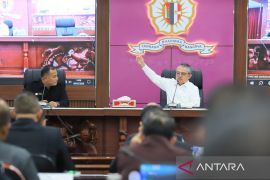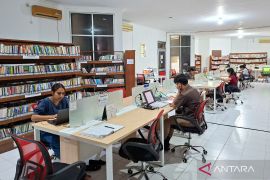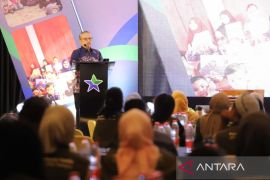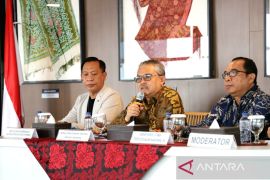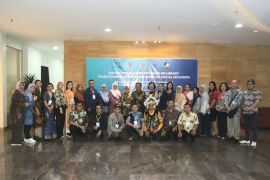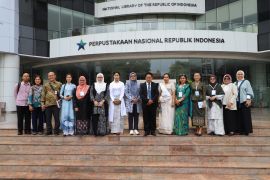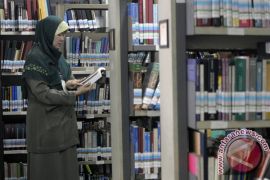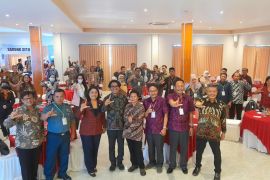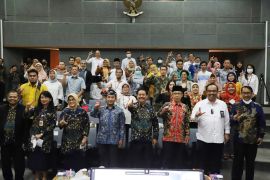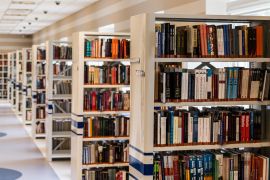Navisa, a Faculty of Law student at Sriwijaya University, Palembang, said the free digital library service has been of great convenience to her as it allows her her to look up academic resources or journals for assignments or theses without the necessity of visiting a library or returning a physical book to the library.
Alhafsi, a student from the Faculty of Mathematics and Natural Sciences at the same university, concurred with Navisa. Besides utilizing campus library resources, he said he has also been able to use resources made available on South Sumatra Library's online database Diary Sumsel to finish assignments.
Once users register at the online database to access the library's collection, they can file a request to borrow multiple books at a time, he added. He said that despite its convenience, due to a limited collection, he could not solely rely on the online library and still needed to look up references from offline libraries.
As a literature enthusiast based in Palembang, South Sumatra, Alhafsi urged libraries to provide universal and easy access, frequently update library collections, and invite youth to work in the library to attract more young readers.
Related news: National assessment vital for mapping learning loss amid pandemic
Cultivating a reading habit
With abundant literature resources, particularly those provided by the National Library, the current issue facing libraries is: attracting the youth to use the digital library or the online repository, as the percentage of visitors remains low despite their being the most digital-literate generation, which can easily access such facilities using their personal gadgets.
According to deputy for resources development at the National Library, Deni Kurniadi, the ongoing library digitization is necessary to cater to the digitally-literate young generation.
The COVID-19 pandemic and the transition to online learning have been a momentum to further embrace information technology and improve the digital library, he added.
Libraries should increase their role to improve the literacy index among children by utilizing digital technology to offer digital library services, besides procuring physical books and reading materials with varied themes, he said.
Related news: Learning freedom to liberate minds of teachers, students: KSP
South Sumatra Library head Fitriana said utilization of digital technology has been part of the library’s long-term program, particularly after the province’s literacy index was projected to increase to 20.5 percent upon engagement with the National Library and 17 universities to improve the digital literature system and improve library staff’s competence.
South Sumatra has also launched an online library application called Diary Sumsel on February 2, 2020. Around 2,000 books and kinds of literature on various topics of science, language, applied science, Nusantara fiction stories, novels, health, and agriculture, are included in the application.
The online library system supplements South Sumatra’s 2,443 existing libraries – 45 general libraries, 12 specialized libraries, 36 university libraries, and 2,350 school libraries -- registered within the national library registry.
From those libraries, around 106 libraries have received the highest accreditation and around 80 percent of libraries have been equipped with a proper computer facility and internet connection.
To further promote reading habits, the South Sumatra government also established 300 reading corners at public places, such as airports, rail stations, malls, terminals, city parks, and hospitals.
One of the reading corners, the Sungai Ijuk reading corner in Kertapati sub-district, Palembang City, has been equipped with digital facilities to support local children's studies.
The decision to boost the digital library system and diversify the literature collection is essential to attract youths' interest in reading and utilizing digital library facilities, and the transition to digital library services is clearly inevitable.
Related news: Government readies Rp541.7 trillion of education budget in 2022
Our current challenge
From Weh Island, the westernmost tip of Sumatra, to Merauke, the easternmost city of Indonesia, the country has recorded varied literacy activity scores among its provinces.
Out of the nation's 34 provinces, around nine provinces have recorded an average score (index score of 40.01-60.00 percent); 24 provinces, the most in the pool, have recorded a low score (index score of 20.01-40.00 percent); and, one province has recorded a very low score (index score of 0.00-20.00 percent). Not a single province has recorded a high or very high score (index score of above 60.00 percent).
The five provinces that have recorded the highest literacy activity scores are Jakarta (58.16 percent), Yogyakarta (56.20 percent), Riau Islands (54.76 percent), East Kalimantan (46.01 percent), and Bali (44.58 percent).
The three provinces that have recorded the lowest literacy activity scores are Papua (19.90 percent), West Papua (28.85 percent), and East Nusa Tenggara (29.83 percent).
With a literacy activity score of 36.06 percent, South Sumatra province has ranked 17th among Indonesian provinces, and yet, it has been included in provinces with a low score.
The National Library data shows that the aggregate of books possessed by regional libraries currently stands at 22,318,083. If the total books are compared with Indonesia's total population of around 268 million people, the book-to-people ratio in Indonesia is an abysmal 0.098 per cent.
Related news: Education Ministry dispatches 970 Indonesian students to 28 countries
To cultivate and promote the reading habit, the central and regional governments should collaborate to address literacy issues in totality. The governments could start by championing a unified commitment among book writers, publishers, translators, and literacy enthusiasts to improve literacy in the country and ensuring equal distribution of reading materials to alleviate literacy activity score discrepancy.
Indonesian educator Fuad Hasan (in Sutarno, 2003) noted three phases that are necessary to promote the reading habit and improve literacy levels among the population: first ensure reading ability and literacy level, then improve reading proficiency and comprehension of a particular text, and follow it up by nurturing the reading habit.
Indonesian youth and those from the “Generation Z” are the digital-literate generation who face no issues in using technology and keeping up with its development.
To promote reading among them, the authorities have the responsibility of providing literature and reading materials. But, to ensure equal access, those materials must also be provided in their digital forms, either as digital books, audiobooks, or other mediums, to attract the interest of the youth to access digital resources.
Related news: Tax revenues utilized to support education, health workers: Indrawati
Related news: Traditional fabric can help economy weave success
Editor: Fardah Assegaf
Copyright © ANTARA 2021

